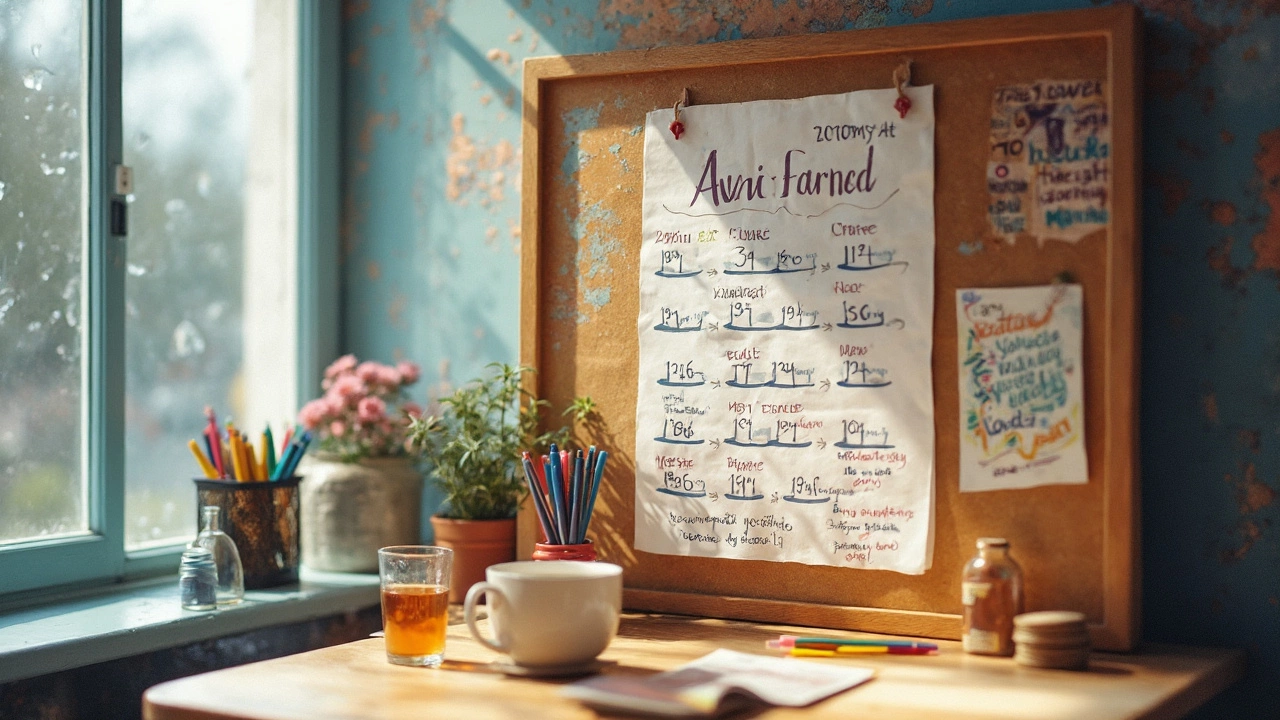So, you're staring down your GCSEs and hearing advice from every direction—"revise for three hours a day!" "You need to do 100 hours a subject!" It gets confusing fast. Here’s the thing: There’s no magic number of hours that works for everyone. Some people grab Bs and As with focused sessions, while others need a bit more time to nail the same grades. It’s all about working out what actually sticks for you and how to keep going without burning out.
The average student aiming for 7s or above usually puts in around 15-20 hours per subject over the months before exams, but this number can flex depending on what you already know and what you still need to cover. Don’t start panicking if that sounds like a lot—broken down, it’s just a few extra hours per week. The real secret? Make those hours count, rather than just watching the clock.
- Finding Your Revision Sweet Spot
- Quality Over Quantity: Why Hours Aren’t Everything
- What Real-life Revision Schedules Look Like
- Balancing Life and Study
- Top Tips for Effective Revision
Finding Your Revision Sweet Spot
When it comes to GCSE revision, people tend to look for a set number of hours to stick to, like there's a magic formula. The real answer is: it depends on you—your strengths, subjects, and how you like to study. Think about this: A 2023 survey by Student Room found students aiming for GCSE grades 7-9 spent anywhere from 1 to 3 hours per subject per week in the last 3 months before their exams. That’s a decent ballpark, but not the full story.
It helps to spot where you need the most help. If you’re acing Maths but dreading Chemistry, you shouldn’t give both subjects the same hours. Prioritize tricky topics. Try creating a list of your subjects, rate your confidence for each out of 10, and arrange your hours to match.
- High-confidence subjects: 1 hour a week just to keep things fresh.
- Mid-confidence: 1.5–2 hours, focusing on weaker areas within the subject.
- Low-confidence: up it to 2–3 hours, with most of that going towards practice questions and reviewing feedback.
Boredom and burnout are real when you force yourself to revise nonstop. Breaks matter. Focus on blocks of 25-50 minutes, then take short breaks—this helps your brain reset and keeps information from blurring together.
Here’s a quick table showing what a typical week could look like if you’re studying 7 subjects and using this ‘sweet spot’ approach:
| Subject Confidence | Weekly Revision per Subject |
|---|---|
| High (e.g. English Lang) | 1 hour |
| Medium (e.g. Geography) | 1.5–2 hours |
| Low (e.g. Physics) | 2–3 hours |
Listen to how you feel while revising. If you start tuning out after half an hour, it's a sign to switch things up. You’ll make faster progress by being honest about what works for you instead of copying what everyone else is doing. That’s how you find your own GCSE revision sweet spot.
Quality Over Quantity: Why Hours Aren’t Everything
Let’s be real—cramming for hours doesn’t equal good GCSE revision. The truth is, your brain can only take in so much before it zones out. Two hours of focused, no-distraction studying beats five hours of staring at your notes while texting friends. Studies from cognitive science labs, like the one at University College London, show that focused bursts of revision (say, 25-50 minutes) help you remember more than marathon sessions.
It’s all about active learning. Instead of just reading over your notes, try:
- Making quick flashcards and testing yourself
- Writing out what you remember on a blank page
- Teaching a topic to someone else (even your dog works in a pinch)
- Mixing up subjects to keep your brain fresh
Mixing in proper breaks makes a huge difference, too. Ever heard of the Pomodoro Technique? It’s basically working for 25 minutes, then taking a 5-minute break. This keeps your mind fresh and stops you from yawning through your exam preparation.
Here’s a comparison that puts things in perspective:
| Revision Style | Average Retention After 1 Week |
|---|---|
| Passive reading (reading notes only) | ~20% |
| Active recall (flashcards, quizzes) | ~70% |
So, don’t just count the hours—make the hours count. Focus on what actually helps you remember and use your time smartly. You’ll thank yourself when you’re relaxed, confident, and smashing those papers instead of panicking at 2 a.m. the night before.

What Real-life Revision Schedules Look Like
Forget perfect, color-coded timetables with hours and hours of GCSE revision every night. Real students juggle clubs, part-time jobs, and, well, wanting some sort of life. The best revision plans aren't about cramming your timetable—they're about fitting revision hours around what you’re already doing.
Here’s a sample week straight from a group of Year 11 students who scored highly last summer:
| Day | Revision Time | Subjects Focused |
|---|---|---|
| Monday | 1 hour after school | Maths (past papers) |
| Tuesday | 1.5 hours after dinner | English Lit (quotes), Science (flashcards) |
| Wednesday | 45 minutes before tea | History (mind map) |
| Thursday | No revision | Football training |
| Friday | 1 hour late afternoon | Science (practice questions) |
| Saturday | 2 hours (split morning/afternoon) | All subjects (weak topics) |
| Sunday | 1 hour post-lunch | English (essay plan) |
Notice a few things: there are breaks, no two-days look exactly alike, and the total stacks up to about 7 hours a week. This kind of plan builds up naturally closer to exams, maybe rising to 10-12 focused hours per week across subjects if you’re aiming for top marks.
When teachers and revision experts talk about "two hours a night," they really mean in the run-up to the actual GCSE exams (think a month or so before). Earlier in the year, 45 minutes to one hour after school, consistently, makes a bigger impact than marathon sessions once a week. Switching subjects and using a mix of study tips—like flashcards, past papers, and explaining stuff to family—keeps your brain awake and your scores climbing.
- Pick your toughest subject first—don’t just stick to your favorite.
- Try to plan your week around real life. Don’t set up for failure with an impossible plan.
- Leave space for chill time, hobbies, and rest. Burnout tanks your memory and motivation.
Authentic exam preparation isn't about hours on a clock—it’s about making each session count and building up over time. Model your schedule on what works for you, not what looks good on a classroom poster.
Balancing Life and Study
If you’ve ever tried to cram for GCSE exams right after a busy day at school, you already know how draining it gets. Trying to squeeze endless GCSE revision hours into your week doesn’t just zap your energy—it can actually make your revision less effective. Your brain needs space to recharge, and so do you.
The UK’s NHS and mental health charities warn that burnout is a real risk for students around exam time. That’s why it’s not just OK to have downtime, it’s necessary. Students who stick to a balanced routine—mixing school, study tips, rest, and fun—report higher levels of satisfaction and better memory retention. The trick is building revision into your schedule without letting it take over everything else.
Here are some ways you can strike a healthy balance:
- Set a weekly plan with fixed start and stop times for revision hours—don’t just keep going until you drop.
- Stick to sensible blocks of 30 to 50 minutes, followed by 10-minute breaks. The Pomodoro technique is a favorite for a reason: it prevents overload and keeps you focused.
- Protect your family time, hobbies, and sleep. Give screens a rest an hour before bed to help your brain wind down.
- Don’t revise right before bed. Sleep is when your brain sorts through what you’ve learned, so quality sleep equals better exam preparation.
Did you know? A study by the University of Oxford in 2023 found that students who averaged two hours of focused revision daily and kept up with social activities saw a 12% improvement in test scores over those who crammed for six hours straight while skipping breaks and friends. It’s proof that less can be more—if you use your time wisely.
If you’re getting swamped, talk to someone. Most schools have pastoral support, and there’s always someone you can message (like Childline or Kooth) for a quick chat. GCSEs matter, but so do you.

Top Tips for Effective Revision
Getting your GCSE revision right isn’t about staring at your books until your brain goes fuzzy. Smart strategies make a huge difference. Here are the things that can seriously boost your results:
- Break it down with short sessions. Research from Cambridge Assessment shows that 25-30 minute revision chunks are more effective than marathon sessions. It’s called the “spacing effect.” Take breaks to keep your brain fresh.
- Use active revision techniques. Just reading notes doesn’t work for most people. Try quizzes, flashcards, or teach what you just learned to someone else. Testing yourself helps information stick much better than passive reading.
- Mix up your subjects. Ever heard of interleaving? It means switching between subjects or topics instead of cramming one for hours. Studies say this makes your brain spot patterns and understand stuff faster.
- Make a revision timetable—and stick to it. Write out when and what you’ll revise each day. Cross off tasks as you go. This keeps you organized and less likely to panic when exams are near.
- Don’t ignore the past papers. Doing past exam papers is one of the most trusted ways to prep for GCSE exams. Get used to question styles, master timing, and see where your weak spots are.
- Stay active and sleep well. Squeezing in a little walk or some stretching between sessions boosts your focus, and getting 7-8 hours of sleep helps turn today’s revision into long-term memory. It’s proven by countless sleep studies.
| Revision Technique | Impact on Results |
|---|---|
| Active methods (quizzes, flashcards) | Raises retention by up to 50% compared to passive reading |
| Past paper practice | Improves grade accuracy and confidence with exam format |
| Proper sleep | Boosts performance by 20% on average |
If your goal is solid GCSE exam preparation, it’s not about who spends the longest time at their desk. It’s about who uses their revision hours wisely. Study smarter, not longer, and you’ll see the difference in your grades and your stress levels.


Write a comment